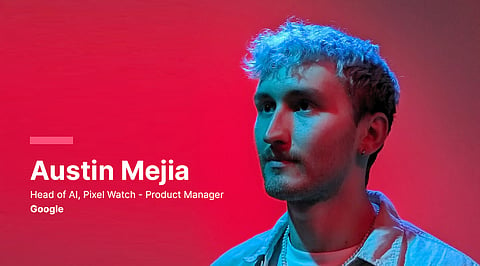

Austin Mejia is the lead AI Product Manager for the Google Pixel Watch, where he spearheads the creation of innovative AI experiences. With a focus on productivity and everyday utility, Mejia leverages Google’s vast product expertise to deliver an unrivaled smartwatch - designed with AI from the ground up, and a host of novel features not seen on other watches.
Mejia launched his career in startups. He worked in Tel Aviv for Israeli startup Syte.ai, eventually landing at JUV Consulting as the Director of Technology, where he was charged to build out JUV’s technical infrastructure. While there, he championed the development of AI models to scale their consulting business. He led JUV’s engineering team while pursuing an independent concentration in Computer Science and Public Policy at Princeton University.
Following his graduation from Princeton, Mejia was one of fifty Americans selected as a Schwarzman Scholar: a one-year, full ride Masters Degree at Tsinghua University, China’s top educational institution. He studied global research ecosystems and how technology can be co-developed across multiple regions - with AI being a core theme.
After graduating from Tsinghua, Mejia returned to the US and joined Google’s Pixel team as a product manager.
Pixel is Google’s flagship hardware brand, having delivered industry-leading mobile experiences for nearly a decade. Starting with a smartphone in 2016, Pixel has expanded into Earbuds, Tablets and, now, Smartwatches. Pixel embodies the best of Google, and is designed to be an industry disruptor in the otherwise stagnating smartphone market. AI plays a key role in the Pixel product line, and Mejia is charged with leading this effort for the Pixel Watch.
Mejia’s goal is to build a compelling and deeply integrated AI experience. Consumers want more than just a good feature, he says - they want one that is embedded in their everyday workflows, and leverages existing information to enhance the user experience. This is particularly needed on a Watch, where it is much harder to navigate the device. Even a simple text, stating you’re running 5 minutes late for coffee with your friend, is arduous on a Smartwatch. Mejia believes AI can help bridge this gap.
AI can also become a helpful, conversational expert you can talk with about your day, health and fitness. Mejia believes in a future where a user can ask their Watch about how well they slept, what meeting do you have next, or how hard you should push yourself in the gym.
Many companies, from Meta to Open AI, are focused on making their AI models bigger - much bigger. This has driven up cost, making them too expensive for most consumer applications, where the challenge is to simplify daily tasks like summarizing emails. In Mejia’s view, this limits innovation, and restricts AI to a few use cases.
Instead, he wants to push the extreme on the small end. Mejia believes improving the performance and reliability of small AI models, like those on mobile devices, will reduce prices, and unlock a new dimension of applications. While they lack the impressive capabilities of big AI engines, like generating images and audio, small models can still excel in essential tasks like summarization or writing. “The work done to improve the largest models is undoubtedly impressive, ” says Mejia. “But improving the smallest models will be transformative - for developers, for businesses, and for everyday people.”
Outside of his work at Google, Mejia collaborates with various universities in developing their AI curricula. At the University of San Francisco, he is an advisor at the School of Management on their Strategic AI Executive Education program, helping industry professionals develop new skill sets. Additionally, he consults with their undergraduate business program, identifying how graduates can be best equipped to enter the workforce. He has advisory roles at the University of Durham (UK), and Kenan-Flagler Business School at The University of North Carolina.
Mejia leverages his background as an advocate for global AI policy and AI for good. He is a member of the AI for Developing Countries Forum (AIFOD), a global organization that convenes annually in the United Nations Office of Geneva. AIFOD brings together AI experts, policymakers, and professionals to harness AI for sustainable development in emerging economies. Mejia is a founding member of the Silicon Valley chapter, and collaborates with global leaders to build a democratized AI future via multilateral policy.
Mejia is leading the future of Wearable AI. Whether it’s through his role at Google, advising universities, or his work with policy forums, he aspires to make AI a technology that is accessible to, and makes life better for all.
